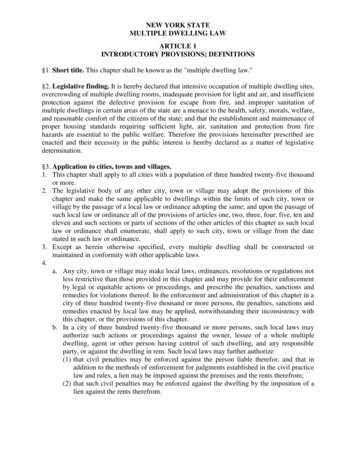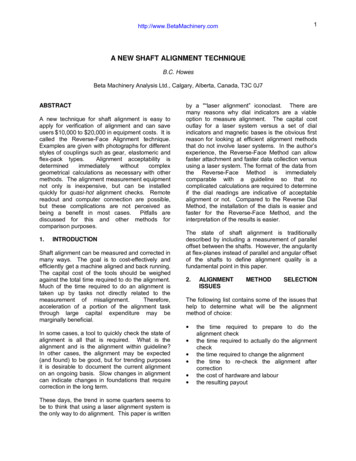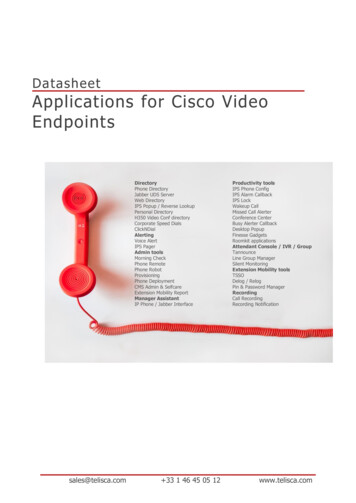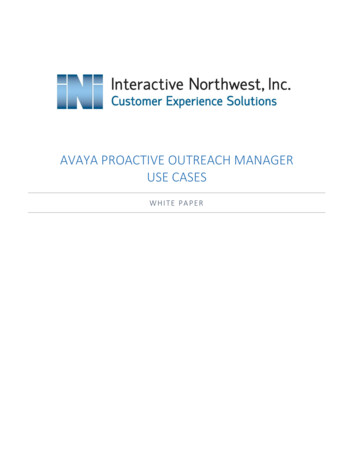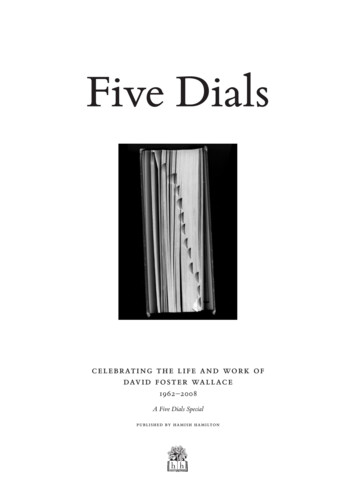
Transcription
Five DialsCELEBRATING THE LIFE AND WORk OFDAVID FOSTER WALLACE1962–2008A Five Dials Specialpublished by hamish hamilton
These tributes were given on 23 October, 2008 at the SkirballCenter for the Performing Arts, New York University, and are reproducedhere with the kind permission of the authors and of Bonnie Nadell, DavidFoster Wallace’s literary agent and longtime friend.Copyright in each tribute remains with its author.
Finally, know that an unshot skeet’s movement against the vast lapis lazulidome of the open ocean's sky is sun-like – i.e. orange and parabolic and right-to-left –and that its disappearance into the sea is edge-first and splashless and sad.—from A Supposedly Fun Thing I'll Never Do Again3
4
Talks and Readings byAmy Wallace-HavensBonnie NadellGerry HowardColin HarrisonMichael PietschDon DeLilloZadie SmithGeorge SaundersJonathan FranzenArtwork bymichael schmelling5
6
Amy Wallace-HavensUntil very recently, David and Iwere lucky in that we had such alimited experience with grief. When ourgrandmother died, just in the last decade,we were emotional novices. I remembersitting next to David at Gramma’s memorial service. Whoever spoke first haduttered maybe five words before we bothbecame loudly unglued – wailing, sobbingand clinging to each other. If we hadn’tbeen in the presence of actual relatives, Ithink the assembled would have surelythought we were shills, that GrammaBetty had not left to chance the level ofdistress that would be registered at herfuneral. We absolutely marveled – clutching our stiff balls of Kleenex – that ourgrandfather could find it in himself tostand and to speak of the honour that ithad been to be our grandmother’s husbandfor sixty years. How could he so calmlyspeak of his heart’s joy in the past tense?This seemed utterly superhuman to Davidand me. And I stand here today not at allcalm but knowing that David would havefound it in himself to do this for me.David was not always an easy brother– forget winning an argument or havingthe last word, ever. But he was loyal andgood and protective. It took him someyears to get over the disappointment ofbeing stuck with a female sibling, but hedid. Although as children we spent a greatdeal of time simply avoiding each other, itwas understood that he was there if I reallyneeded him. When I was ten, I decided totry out for Little League, which was notmuch done by girls in those days. I knowthat David was probably horrified in hisheart of hearts, but he took it upon himself to teach me to catch a fly ball, to rundown a grounder, and – most importantof all – not to throw like a girl. To this dayI have a decent arm, although I imagineI throw like a boy who would rather bereading Kafka or watching The Waltonsthan playing baseball.In the days following David’s death,my mother and I realized that we couldsit in front of the computer and conjureDavid on YouTube. There he was on theIsle of Capri, struggling to explain to theItalian-speaking audience that this was hisfirst experience ever of being in a placewhere he didn’t speak a single word of thelanguage. There were David’s mannerismsand loveable self-mocking digressions, andfor a moment I actually forgot that he wasdead – there he WAS, for heaven’s sake –explaining to the chuckling crowd that hefelt like a baby, he could not understand,and he could not make himself understood.Although I have been in the companyof fellow native speakers since that awfulSaturday morning when my husbandthrust the phone into my hands, I havefelt my ability to communicate and tocomprehend slide away. I simply cannotfind the words to express what David’sabsence feels like, and I cannot begin tounderstand that this is forever. The language of grief is hideous and guttural,comprised of lung-tearing sobs and strangled screams. And although I am sure thatmany of you have found yourselves in thisempty, wordless place, I simply feel thatno one will ever truly understand, least ofall me, how words will have any functionany more.If David could have been a little bitgentler with himself, perhaps he couldhave simply shut up shop for a while andtried to heal. But unlike almost any otherprofession, writers cannot ‘retire’ – if theystop writing, they cease to be writers, atleast in their own minds. David lovedbeing a writer, not so that he could dazzleus with the glorious arias of his intellect,but so that he could take us with him as he7questioned what most of us don’t botherto question. David was not a know-it-all.If he was a genius it’s because he was smartenough to be curious about everything.So many of our conversations began withDavid’s saying ‘Why do you think . . .?’ or‘Do you ever wonder . . .?’. David alwaysthought, and he always wondered. Ashis depression essentially metastasized,although he was panicky and sleepless anddropping huge amounts of weight, I thinkit was the fear that he would never be wellenough to write again that finally consumed him. It was the writing that made itso much less lonely to be in his head.He fought very hard. This was not hisfirst battle with clinical depression, and thefact that he had survived that earlier timemade us hope that he could do it again.Depression is not well understood, but inDavid, although chemicals were runningamok in his brain, this seemed like a cancerof the soul. The fact that he was loved sofiercely by his friends, his family, his wife,could not penetrate the fear and loneliness.David simply ran out of the strength tohope that tomorrow might be a little bitbetter.Shortly before David’s death, I re-readAlice Sebold’s The Lovely Bones, and thenotion that each person made his ownquirky sort of heaven resounded as I triedto believe that David – not his oeuvre butDavid – was separated from us merely bya sort of membrane. In David’s heaven,he can eat chocolate Pop-Tarts again, andpeople never say, ‘I’m nauseous,’ whenwhat they really mean is that they thinkthey’re going to throw up. In David’sheaven the horizon stretches an uncluttered Midwestern forever and the scent ofbayberry candles is everywhere. But mostimportantly, he can put his fingers in hismouth and whistle to summon his beloved,departed dogs – Roger, Drone and Jeeves.David and his dogs go for endless runs,and his enormous high-tops make nosound in the clouds.Thank you so much for being here. Myfamily and I are proud beyond measurethat our boy meant so much to so many.He meant everything to us.
Bonnie NadellIknew David as his literary agent. Wemet in 1985, when he was an MFA student at the University of Arizona andI had just moved to San Francisco andbecome an agent with Fred Hill. He hadnever published a story outside of collegeand I had never sold a book. We grew upin publishing together.From the very beginning I knew Davidwas smart. When he sent out the queryletter for The Broom of the System, his firstnovel, he used the word ‘diachronic’. Ididn’t know what it meant, looked it upand found it means ‘out of order’. Whichmade perfect sense, since he had sent theeighth chapter of the novel instead of thefirst. It didn’t take me long to realize thatDavid was the smartest person I had evermet. I loved his writing and wanted theworld to see his gift.The thing is, David always wore hisintelligence so lightly. The Broom of theSystem ends without the last word anddoesn’t really have a final scene. I, with thewisdom of a twenty-five-year-old, triedto convince David to wrap up the story ina traditional fashion before I sent it out topublishers. He proceeded to explain to me,using Wittgensteinian philosophy, why itwas written like that and needed to remainjust as it was. I think that was when Iunderstood that David’s mind worked inan entirely different way. Of course GerryHoward, his editor, had the same conversation with David a few months later. Thebook was published as David wanted.David had a complicated relationshipwith fame from the very beginning ofhis career. He liked the attention but hecouldn’t shrug things off the way mostwriters can. He never read his reviewsor wanted to know print runs or salesfigures. Never wanted to be interviewedon TV the times he got asked, or go toparties, or meet the Hollywood producerswho optioned his books. In order to write,David couldn’t be in the public eye andstill function. It was simply too hard forhim. David didn’t have the armour mostof us develop to survive in the world. Iknew this and so did his publishers Little,Brown and Company; we all protectedhim. Being David’s agent often meantbeing a shield for him.Because David needed to keep himselfapart from the noise of our culture, peoplewould ask sometimes if he was difficult asa client – was he condescending, patronizing? Never. David was an incredibly sweetperson. If anything he would offer up toomuch. When David was writing abouttalk radio in LA for the Atlantic, he calledone afternoon to get directions to thenearest Koo Koo Roo. He had promisedto pick up that night’s take-out dinner forthe tech guys at the station. I tried to convince him that the writer from the Atlanticwasn’t the onewho had to buythe evening’schicken takeout. But I alsogave him thesimplest possibledirections, sinceI knew he hateddriving aroundLos Angeles andwas going to doit anyway. Andthat he wouldthen spend histime at the station sitting ina back roomwith these guys,eating his owntake-out dinner, listeningto them andabsorbing everything they said.This spring,before thingsgot bad, Davidwas going towrite aboutObama andrhetoric forGQ. David waslistening toObama’s speech-8es and GQ had reserved him a room at theconvention in Denver. I knew David wasnever going to meet Obama or even getnear him. He wanted to spend his timewith the speechwriters sitting in Chicagosweating out Obama’s words. EverythingDavid learned would have come fromwatching from the outside, from beingon the edge. And if David had been wellenough to go to Denver, he would havespent most of his time in his hotel roomor somewhere far away from the actionand chatter. But he would have shownus things we would never have noticed,people we would never have spoken toand had ideas about rhetoric and languagethat most of us would never have thoughtwithout him.For twenty-three years David mademe see the world through his eyes – mademe think harder, feel infinitely sadder andlaugh at all sorts of crazy things. We willall miss him dearly.
Gerry HowardWhen you reach your late fifties,as I have, the question ‘What haveyou done to justify your miserable existence?’ presents itself with steadily increasing insistence. I’ve formulated a number oftentative answers to that question, but oneof the best I can offer is, ‘I published thefirst two books by David Foster Wallace.’In an editorial career, the shocks ofrecognition arrive at highly irregularintervals – those moments when a manuscript grabs hold of your mind and heartand says, ‘Baby, we were made for eachother.’ That’s exactly what happenedwhen the manuscript of The Broom of theSystem hit my inbox at Penguin in 1986,courtesy of Bonnie Nadell. What a startlingly fresh and original book that was,a neo-postmodern extravaganza, ultrabrainy and high-spirited at a time whenAmerican fiction was mostly out strollingthe strip malls or cruising the clubs. Wepublished it as the first trade paperbackoriginal in our Contemporary AmericanFiction series, and it was a critical andcommercial success. And this remarkable book brought David Wallace, a trulyremarkable person, into my work life. Iam so proud and happy that twenty-plusyears later The Broom of the System is stillselling steadily and drawing new readersinto David’s uniquely imagined world. Iwas re-reading it last night, and I had towonder, how did I ever slip this one pastthe Authorities? It’s a wild piece of work– hysterical realism, yo. (I read Our MutualFriend over the summer, and it seemedtotally clear to me that Charles Dickenshad been deeply influenced by David Foster Wallace.)In my mind David will always be young.At twenty-four when our paths crossed, hewas painfully deferential, totally unworldly, woefully underdressed, but you knewthat he possessed a formidable, even staggering talent and intellect. Maybe myfavouritest moment in publishing ever wasa reading that Penguin arranged for theCAF series at the McBurney YMCA, withT.C. Boyle, Laurie Colwin, Frank Conroyand David reading from their work, withme introducing them in alphabetical order.As the first three mature and practised literary stars strutted their stuff, David sankdeeper and deeper into his seat, clearlysuffering the tortures of the damned. Itwas his first reading EVER – what had wedone? I can still taste my guilt. But thenhis turn came, he got up, walked to thelectern, calmly took a long sip of water,said, ‘Ahhhh,’ and read the epileptic baby/John Irving send-up section of Broom withincredible brio. As the song goes, he blewthat room away. He was the Ruby Keelerof fiction – he went out there a nobodyand he came back a star. I was in awe.But as all who knew and worked withDavid know, he never carried himselflike a star in the least. In fact he had nodefences, in my experience, against thetoxins endemic to the literary industrialcomplex. I vividly remember one Augustday in 1988 when Davidcame down to the cityfor, God help us, aphoto-shoot for someslick magazine on ‘theHot Young Writers’.David had been upat Yaddo with a fastcrowd – Jay McInerney,David Leavitt, MonaSimpson – and all theirtalk of Andrew saysthis and Binky doesthat had really knockedhim sideways. Thatmorning’s shoot, withTama Janowitz andChristopher Coe, a veryflamboyant gay novelist, camping about, hadfinished the job. By thetime he arrived at myoffice for lunch he wasin the midst of a fullblown anxiety attackor nervous breakdown.Oh my. So I reachedback to the skill-set thatthe sixties had equippedus all with and calmly9talked him down, just the way we used todo in the dorms when someone was having a bad trip. Trust me, it was exactly likethat.So many memories come back: that justincredibly squalid Somerville apartmenthe shared with Mark Costello, with thosetextbooks on symbolic logic whose titles Icould not understand, let alone their contents. The eyestrain-causing five- and seven-page single-spaced editorial letters without a single typo that hog-tied my muchslower brain. The somewhat unfortunatechewing-tobacco years. The sweetness andthe vulnerability and the modesty. Witha mind like his, David could have easilyapplied himself to some money-spinningjob like, I don’t know, devising fiendishly complicated financial instruments toleave the American economy in smokingruins. He could have done that! Instead hedevoted his genius to renewing the fragileenterprise that is serious American writing. That’s serious, not solemn. He was themost idealistic of ironists, and his vision ofthe world was fuelled by deep wells of sincerity and a dogged quest for authenticity.Oh boy, will we miss him.
Colin HarrisonOne day in the spring of 1995, I got aphone call at Harper’s Magazine fromDave. He was calling from a 700-foot luxury cruise ship, called the Zenith, off thecoast of Florida. I’d sent him on this tripto write an article, and he’d phoned justto let me know that yes, he was on board,as planned, and, by the way, what exactlywas his magazine assignment again?I paused before answering.Telling Dave what to write about wasa tricky proposition. In his previous nonfiction piece for Harper’s, in which he’dwritten about the Illinois State Fair, Davehad, within the first few lines of the piece,blown up any idea that he consideredhimself a conventional journalist and alsogleefully detonated the notion that I, hiseditor, knew what I was doing.Let me quote from that piece:‘I’m fresh in from the East Coast, foran East Coast magazine,’ he wrote. ‘Whyexactly they’re interested in the IllinoisState Fair remains unclear to me. I suspect that every so often editors at EastCoast magazines slap their foreheads andremember that about ninety per cent ofthe United States lies between the coasts,and figure they’ll engage somebody to dopith-helmeted anthropological reportingon something rural and heartlandish.’Ah, to be cleverly ridiculed in the pagesof one’s own magazine. So now, as Davefloated somewhere off the coast of Florida,I knew that whatever answer I gave himcould be subject to inclusion in the pieceitself, and perhaps even a source of furthermockery.But there was another reason I hesitatedto answer his question. In telling Davewhat the magazine assignment was, I mightaccidentally suggest what not to do, whichcould be unwise. The smart thing wouldbe to just let Dave and his imagination andneuroses run wild. In his piece on the Illinois State Fair, curiosity and anxiety hadcombined again and again to great effect.I figured that the best thing was togive Dave no editorial guidance whatsoever.Not a word. So, no, there was no par-ticular assignment, except that he was tobe Dave Wallace on the spotless cruiseship ploughing through the aquamarinewaters of the Caribbean. I said, ‘There’snothing else I can tell you, Dave.’ Therewas a pause. I’m willing to bet Dave madeone of his lightning-quick facial grimacesbefore responding, ‘Okay.’ He seemedsimultaneously relieved and amused, likehe knew something I didn’t – which was,of course, already true.I like to think of that conversation nowbecause I know moreor less what happenednext. Dave – big,fleshy, semi-shavenDave Wallace, withhis bandana and hissneakers and his quicksmile – explored thathuge luxury ship,inspecting its manyrestaurants and gaming rooms and lounges, all twelve decksand 1,374 passengers,their acres of horrifying flesh soon fryingin the sun. He piledup tens of thousandsof fabulous words describing the ship andits inhabitants. As for that frying flesh,he’d write, ‘I have seen every type of premelanomic lesion, liver spot, eczema, wart,papular cyst, pot belly, femoral cellulite,varicosity, collagen and silicone enhancement, bad tint, hair transplants that havenot taken – i.e., I have seen nearly nakeda lot of people I would prefer not to haveseen nearly naked.’ These are the kinds ofdetails that sickeningly thrilled him.Naturally, though, Dave found theship’s relentless pampering highly stressful, so he semi-agoraphobically retreatedto his room, especially to the shower, ofwhich he said, ‘itself overachieves in avery big way. The HOT setting’s water isexfoliatingly hot, but it only takes onepreset manipulation of the shower knobto get perfect 98.6 degree water. My ownpersonal home should have such water10pressure: the shower-head’s force pins youhelplessly to the stall’s opposite wall, andthe head’s MASSAGE setting makes youreyes roll up and your sphincter just aboutgive . . .‘But all this is still small potatoes compared with my room’s fascinating andpotentially malevolent toilet. A harmonious concordance of elegant form and vigorous function, flanked by rolls of tissue sosoft as to be without perforates for tearing,my toilet has above it this sign: THIS TOILET IS CONNECTED TO A VACUUM SEWAGE SYSTEM. PLEASE DO NOT THROWINTO THE TOILET ANYTHING OTHERTHAN ORDINARY TOILET WASTE ANDTOILET PAPER. The toilet’s flush producesa brief but traumatizing sound, a kindof held, high-B gargle, as of some gastricdisturbance on acosmic scale. Alongwith this soundcomes a suction soawesomely powerfulthat it’s both scaryand strangely comforting: your wasteseems less removedthan hurled fromyou, and with avelocity that lets youfeel as though thewaste is going to endup someplace so faraway that it will havebecome an abstraction, a kind of existential sewage-treatment system.’He loved writing that, I know he did.A few months after his call, Daveturned in an ocean-liner of a magazinepiece, way too big to dock. We devotedtwenty-four entire pages of the magazineto the article and, but for the need to runsome advertising, would have includedmore. Although the article was lacedwith Dave’s obsession with mortality andyes, even references to suicide, his attentive detail to his fellow travellers revealeda kind of love for them. While aboard,Dave surely sensed he was on to something big, something cohesive and funnyand utterly original. He must have hadfun writing that piece, as self-laceratingas it was, and so this is how I prefer toremember Dave. Smiling. Laughing.Happy that he just wrote somethinggreat.
pp. 327 30. Michael, have mercy. Pendingan almost Horacianly persuasive rationale onyour part, my canines are bared on this one.Michael PietschIwork for Little, Brown and Company,and I had the tremendous good fortuneto work with David Wallace on his booksInfinite Jest, A Supposedly Fun Thing I’llNever Do Again, Brief Interviews with HideousMen, Oblivion and Consider the Lobster. AndI want to say right at the start that working with David was a thrill beyond anything I imagined when I entered this profession. The novel Infinite Jest is, I believe,one of the great American works of fiction,a work of mind-boggling ambition andoriginality that depicts contemporary lifeas a surfeit of pleasures and indulgencesthat can make connection with otherpeople lethally difficult. Since encountering that novel I’ve found it difficult toview life in our times in any other way.My goal here today is to try to getacross in some way how much I lovedDavid, and why, and how lucky I feel tohave known him. First: for the things hewrote. I got to know David because I wasa fan. Even if I’d never known him I’d bemourning the loss of a writer who tookin the fire-hose blast of our world in allits voices and forms and varieties and gaveit back to us in these gargantuan, howlingly funny, nakedly sad, philosophicallyprobing novels, stories, and essays. Hedelineated the inside of the skull, the convoluted self-talk we all carry on constantly, in a way that no writer ever has. Andat the same time that he could capture thetiniest granularities of self-consciousness,he also saw and could draw the broadestoutlines of the big-picture world. Hisbooks are vast terrains that will continueto be explored in readers’ minds as long asthere are readers.But I did know David, in a particularand maybe peculiar way, and my lovefor him is rooted in fifteen-plus years ofworking closely with him on his booksand on helping him bring those booksto readers. Our relationship was a longdistance one. My old Rolodex card forhim has addresses crossed out in Tucson,Urbana, Somerville, Arlington, Brighton,Syracuse and Bloomington before theClaremont entry in the Contacts folder onpp. 739 48. I’ve rewritten it – for about theeleventh time – for clarity, but I bare teeth allthe way back to the second molar on cutting it.my computer. David came to New Yorkseldom. Once he wrote to me, apropossome NYC brouhaha about who had andwho hadn’t gotten nominated for someaward, ‘This is why I’m glad I live in acornfield.’We communicated mostly throughletters. And through a form of communication that I thought of as a Dave speciality, the phone message left on the officeanswering machine hours after everyonehad departed. Very few emails – he cameto email reluctantly, and preferred the narrow-margined single-spaced letter in tenpoint Times Roman over all other forms ofwritten communication. I never saw whathe was like in the morning before his coffee,I never sat and watched a video or a football game or a tennis match with him. Butin our occasional visits and our hundredsof letters and phone calls and late-nightmessages, I saw what he was like while hewas writing, and revising, and working outwhat exactly he wanted a novel or story oressay to be.Those letters were extraordinary, andI tore into every one of them hungrilyknowing there was pleasure awaitingme inside. Mostly the letters had to dowith the editing of his books. They aredocuments of the superhuman care Davidtook with his writing, but at the sametime of the joy and pride he took in hiswork. Here is a sample from innumerablepages of back-and-forth on Infinite Jest, inwhich David was responding to requestafter request for cuts. Which cut requests,please bear in mind, were the work he hadasked me to do:p. 52. This is one of my personal favourite Swiftian lines in the whole manuscript,which I will cut, you rotter.p. 82. I cut this and have now come back anhour later and put it back.p. 133. Poor old FN 33 about the grammarexam is cut. I’ll also erase it from the back-updisk so I can’t come back in an hour and put itback in (an enduring hazard, I’m finding).11p. 785ff– I can give you 5,000 words oftheoretico–structural arguments for this, butlet’s spare one another, shall we?David’s love affair with the Englishlanguage was one of the great romancesof our times, both a scholarly learnevery-nuance love and a wildly passionateflights-and-flourishes love. David’s ideaof an unbeatable magazine assignmentwas when he was asked to review a newdictionary. One of his proudest moments,he wrote, was when he learned ‘I get tobe on the American Heritage Dictionary’s Usage panel . . . My mom whoopedso loudly on the phone that it hurt my earwhen I told her.’ David loved encountering new words. In one letter he wroteof ‘the last sludgelets of adolescent selfconsciousness being borne away on thehorological tide.’ And added in parentheses, ‘I just learned the word “horology”and was determined to use it at least once.’No mention of the fact that he had justinvented the word ‘sludgelets’. I think hewanted to use every word in the languagebefore he was done. In one talk about thedrawbacks of using words that sent readers running to their dictionaries, I mentioned a favourite book by another writerwhose first word is the very obscure‘picric’. (Means yellowish.) David’s instantresponse was, ‘I already used that!’I worked with David at the professional interface between him and hisreaders, a borderline he approached withvast apprehension. To say that David wasuncomfortable in the public eye is tounderstate enormously. He said no thankyou, politely but unalterably, to an invitation to appear on The Today Show whenInfinite Jest was published. He submittedto photo sessions only when placed undermultiple duress not just by his publisherand his publicist but also by his beloved literary agent, Bonnie Nadell. When Davidvisited our offices, people would jostle forthe chance to meet him. David wrote ofthose encounters, ‘People who regard meas a Golden Boy make me feel lonely and
unknown.’ His manners were too good forhim simply to say no to those encounters,but he would turn the conversation withinseconds to the assistants who he dealt withday to day, or to the twins his publicisthad just given birth to, or to any subjectother than himself.‘I don’t want to be a hidden person,or a hidden writer: it is lonely,’ he saidin another letter. He shied from beingknown in a public way but he workedhard not to be hidden from the people heencountered in person. He wanted themto know him himself, not some caricatureor idea of him. One way David endeavoured to be known was by endeavouringto know others. His solicitousness waslegendary. In one note he asked me toremind a new mother in the office that itwas time to switch from skimmed milk to2% or whole milk. He wrote thank younotes not just to the copy-editor whoworked on Consider the Lobster but also tothe supervisor who had assigned the job toso talented a copy-editor, and he offeredto pay a bonus out of his own pocket tothe designer who wrestled down a particularly gnarly layout. My daughter stillremembers from a visit to our house adozen years ago the nice man who playedtag with her and her little brother, andwho invented ‘worm tag’ when ordinarytag grew dull.Everyone I’ve talked to in the weekssince he died has recalled how kind Davidwas. And it’s true: he was sweet, he waskind, he was solicitous. I’ve spent a lotof time wondering why this is such aprominent note. I think it’s because hewas, and because he knew enough aboutpain to know exquisitely how much kindness matters. And because he knew thatpeople who had read his work expectedto be intimidated by him in person. Davidknew that his image could scare peopleoff or make them afraid to talk to him, soI think he worked extra hard – throughkindness – to get them to see him as hereally was, not as a formidable bandanasporting wunderkind. I’m not saying thekindness was a tactic: David’s mannersand concern for others were bred deepand genuine. But maybe the smiley faceshe drew in the margins of his letters likea goofy schoolkid, the casual (on a goodday) way he dressed, the playfulness andjocularity that I will not begin to be ableto capture here, all helped make sure thatpeople didn’t feel intimidated. He wantedto let people in. The critic Laura Millerobserved that he was smart enough toknow that every person he encounteredwas smarter than him in some way, aboutsomething, and that there was something he could learn from everyone. I’mreminded of his essay ‘The View from12Mrs Thompson’s’, about the days after9/11, when he sees that everyone has anAmerican flag of some kind, a big one forthe porch or a small one for the car. Andhe doesn’t have a flag, and has no ideaeven where you go to buy one, whenevery other person in the country seemsto have been born knowing these things.Always something to learn.David’s great act of kindness to me wastrusting me to help him bring his booksinto the world. I couldn’t pretend to graspthe depth or magnitude of all he set outto do, but he needed an Authority Figurewho he would listen to sometimes, and Iwas lucky to be the one who he fitted outfor that role. Of one scene I proposed cutting he wrote: ‘Well, it introduces threecharacters, five themes and two settings.’His patience with me is one of the thingsthat I will always treasure.David wrote, ‘I want to author thingsthat restructure worlds and make livingpeople feel stuff ’. He certainly did thosethings. The world has a huge hole in it forthe lack of his giant brain and his giantheart to take in and examine for u
Alice Sebold's The Lovely Bones, and the notion that each person made his own quirky sort of heaven resounded as I tried to believe that David - not his oeuvre but David - was separated from us merely by a sort of membrane. In David's heaven, he can eat chocolate Pop-Tarts again, and people never say, 'I'm nauseous,' when
